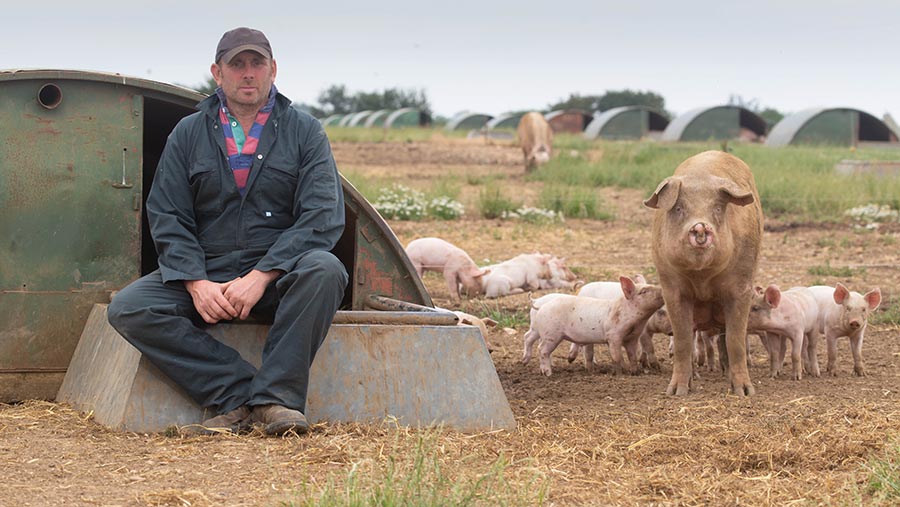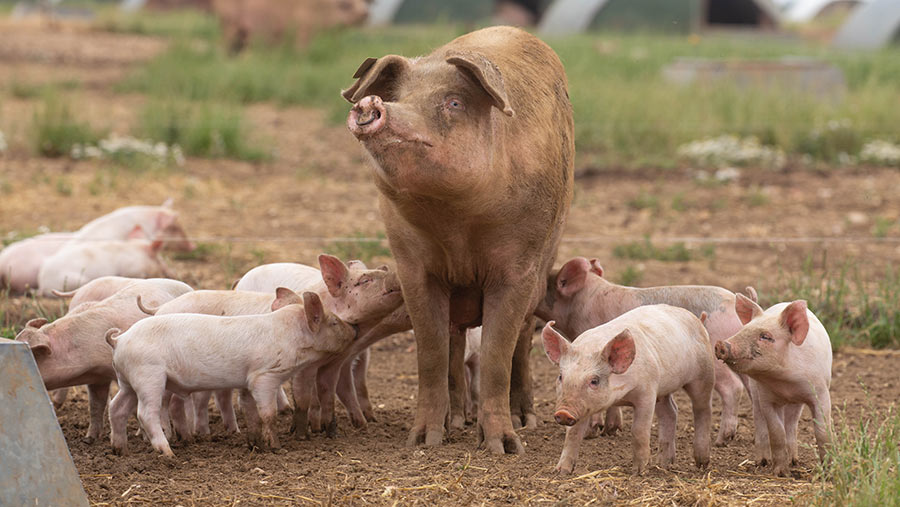How staffing has enabled a Norfolk pig producer’s expansion
 © Tim Scrivener
© Tim Scrivener Unprecedented challenges in the British pig industry have not deterred the Farmers Weekly 2021 Pig Farmer of the Year from thinking about how he can future-proof and ensure the longevity of his business.
Richard Mellor is tenant at Grange Farm, near King’s Lynn, where he runs a 990-sow outdoor breeding unit, producing weaner pigs for pig farming operation BQP.
He has recently added a new 1,000-sow unit to his setup, based just three miles from the home farm.
Richard was approached by BQP in March last year about setting up a second unit.
With labour a recurring challenge for pig producers, he says resourcing and securing staff before expanding the operation added a great deal of certainty to his plans.
See also: Advice on how to build and keep a good farm team
Farm facts: Grange Farm, near King’s Lynn
- 140ha (346 acre) county council farm, of which 93ha (230 acres) is down to cereals
- Produces weaner pigs for BQP grower farms
- 990 sows on a two-week batch production system
- 93% farrowing rate
- Weans pigs at five weeks old, instead of the industry standard of four weeks
- New unit comprises 1,000 Landrace cross Duroc sows, sired with the new PIC 800 semen
New crew
“As with all areas of agriculture, finding, recruiting, and retaining decent staff is a real challenge – particularly in the pig sector,” he says.
However, he had someone in mind.
“A few years ago, I had a chap named Lee Hewitt working for me, who ultimately left only because he wanted to take on a more managerial role which, at the time, we could not facilitate.
“So, we approached him to see if he would be interested in running this second unit, before we even looked at suitable sites.
“Obviously, it is a little bit backwards, but we wanted to make sure that we had the staff sorted before we even ventured down this route.”
As luck would have it, Lee also has three sons who are all pigmen, and they were instantly able to form a crew to run a second unit, adds Richard.
Site suitability
The next stage was speaking to BQP about setting up a new gilt start-up unit and searching for a suitable site, he explains.
They thought they had found a couple of pieces of land that would work but had to give one up as it was too close to other pigs.
“We nearly agreed on another piece of land in February this year, [but then] we were approached by another BQP producer,” says Richard.
“He has several units not far from us, and said he wanted to sell one of them and asked whether I would be interested in it.”
This resulted in him buying an existing BQP unit about three miles from Grange Farm.
As well as the site, the purchase includes 1,000 Landrace cross Duroc sows which run on a five-week weaning system – the same as Richard’s existing unit.
“It is already a well-run unit, so while I’m sure we will make one or two tweaks as time goes on, it is already performing well.
“Our lads spent two weeks on the unit before we officially took it on, just to understand where everything is and how it all works, which has really helped smooth the transition.”
Changes to Grange Farm
Back at Grange Farm, Richard is also looking to make changes.
The unit is going through a repopulation at present, with a new herd of 1,100 sows coming in at the end of June. This will spark the move to a single-parity system, he explains.
Sows will now arrive in-pig and be run on for two-and-a-half years before they are culled and the herd is repopulated again.
Richard says he has taken inspiration from other producers operating a single-parity system with success, and hopes this will simplify operating the unit.
“As well as this site and the new one, we also grow arable crops and rear cattle. So not having to worry about gilt replacements, for example, will make the whole job a little easier.”
The change will complement the five-week weaning system too, he adds.
“On a single-parity system, you should have a better health status within the piglets, largely because you are not bringing new animals in and upsetting the status quo of the unit.”
For now, the second unit will continue to run on a conventional system, selecting 25 gilts every two weeks as replacements.

© Tim Scrivener
Future planning
The investment in a second unit and the changes at Grange Farm form part of the plan to future-proof the business, says Richard.
“BQP has been talking to us over the past few years about whether or not we would be interested in a second unit.
“While we were, it was just not something we thought we could do, largely down to the difficulties with staffing. But [having found] four really good people to run a second unit, we thought it would be a good time to just go for it.
“Without this, I think the decision would have been much more of a head-scratcher. Lee has a very similar outlook to me with regards to how things should work and be done, so I’m confident it will run well.”
While Richard is able to expand, many other producers are in a very different position. Reports continue of farmers cutting herd numbers as a result of price struggles, labour shortages, changes to legislation and a lack of clarity on the future of trade deals.
While he acknowledges he is perhaps more protected owing to his contract with BQP, Richard says he is still confident in the future of the British pig industry.
“We are being told that there is still a demand for pigs. Obviously there has been an issue with pigs being processed, but I hope we are coming to the end of that.
“I have noticed an improvement for us on farm, with the last four weanings sent on the week we weaned. Prior to that, we were having to hold them for a week on farm.
“That said, there have been times where we have questioned whether we are doing the right thing, but BQP is committed and driven to move things forward, which has got to be a good thing.”
Farmer Weekly 2022 Awards

Join Farmers Weekly in celebrating the farming industry and recognising the hard work of UK farmers at farming’s biggest night out – book your table today.
For more information about the 2022 Farmers Weekly Awards, visit the Farmers Weekly Awards website.
